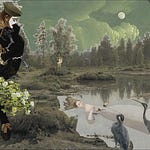I. THÉÂTREJe rêve un théâtre de chambre, Dont Breughel peindrait les volets, Shakspeare, les féeriques palais, Et Watteau, les fonds couleur d’ambre.
Par les frileux soirs de décembre, En chauffant mes doigts violets, Je rêve un théâtre de chambre, Dont Breughel peindrait les volets.
Émoustillés par le gingembre, On y verrait les Crispins laids Ouater leurs décharnés mollets Pour Colombine qui se cambre. Je rêve un théâtre de chambre. I. THEATER
I dream up a chamber theater where Breughel would paint flying flats, Shakespeare, fairy palaces, and Watteau, amber backdrops.
On shiverish December evenings, warming my violet fingers I dream up a chamber theater where Breughel would paint flying flats.
Aroused by ginger-root, you’d watch ugly Crispins stuff cotton round their scrawny calves for Colombine who thrusts her tits. I dream up a chamber theater.
NOTES (by line number, starting with the title).
1 This first rondel of Albert Giraud’s book Pierrot Lunaire is also rondel I, otherwise untitled, in his earlier publication Rondeaux Bergamasques (1883).
2 rêve : All editions of Dictionnaire de l’academie Francais say rêver is intransitive but can take a semantic object tagged with de; then immediately add that rêver can also (as here) be transitive! My “dream up” follows the Oxford English Dictionary’s remark that since 1835 the object of “dream up” is “chiefly an idea, plan, etc., esp. one that is ingenious or fanciful”.
théâtre de chambre : Literally ‘chamber theatre’, apparently first used by F. de Genlis in Adèle et Theodore ou lettres sur l’éducation (1782). J. S. Ersch and J.-G. Gruber, in Encyclopädie der Wissenschaften und Künste (Leipzig, Brockhaus, 1828), vol. 8, p. 112, refer (using German Kammerspiel) to ‘theatrical performances in French’ at the Russian ‘imperial chamber theater in the Hermitage’.
3 Breughel : Jan Brueghel the Elder, nicknamed Paradise Brueghel (Albert Giraud preferred the spelling ‘Breughel’). In his essay Études d’Esthétique, Giraud wrote « Les doux et vibrants miroirs du rêve terrestre, Watteau, Breughel de Paradis, Fragonard, ne deviennent-ils pas soudain pensifs et dolents? », ‘The sweet and vibrant mirrors of the earthly dream, Watteau, Paradise Brueghel, Fragonard, do they not suddenly become pensive and doleful?’
volets : Two-sided paintings of scenery, with mechanisms to exchange the sides very quickly in ‘transformation scenes’ for the innovative 19th century féeries that fascinated Giraud (see II.4); even if Breughel had ever painted theatrical sets (of which I have found no evidence), he would never have seen « volets ».
4 féeriques : ‘In the style of féeries.’ In the 1883 version of this rondel, This line is as printed in RB1883. In HP1889 « Shakespeare » has become « Shakespear », and the palaces are « pâles ». Why?
5 Watteau : Antoine Watteau, an early rococo painter of Flemish extraction, noted for both the glowing amber tones of some of his scenery and his depictions of commedia dell’arte actors on- and off-stage. F. M. Grimm, describing a premiere at the Comédie Italienne in November 1780 (Correspondance [etc.], Paris, Longchamps, 1813, p. 213), wrote « Cette jolie bagatelle a infiniment réussi; elle présente une suite de situations dignes du pinceau de Téniers ou de Watteau », ‘This pretty trifle succeeded infinitely; it presents a suite of dramatic situations worthy of the brush of Teniers or Watteau’. See XXI.2 and XXV.13.
fonds : In all editions of Dictionnaire de l’academie Francais, in painting fond means very specifically « champ sur lequel les figures d’un tableau sont peintes », ‘field on which the representations of persons are painted’. The 1835 edition is the first to add that « Il se dit, au Théâtre, de La décoration qui forme le fond de la scène », ‘It is said, in Theatre, of The [painted] decor which forms the background of the scene’. See also II.1 and XXXVII.13.
6 frileux : This personal attribute—’sensitive to the cold’ or ‘inclined to shiver’—is a dissimilated form of Old French *frireux < Latin frĭgōrŏsus, cold or chilly (J. Picoche, Dictionnaire Etymologique du français, p. 312). English ‘starven’ has this meaning but is hopelessly obsolete. Giraud’s application of « frileux » to December evenings is both an implicit personification and an agent/patient switch. In his 1898 book Héros Et Pierrots he uses it similarly in two poems (Allégorie and Les Mauvais Anges) and the verse play Pierrot Narcisse.
10 Émoustillés par le gingembre : The plural « Émoustillés » can only refer to « les Crispins laids », not to the (grammatically singular) « on » who watches them. Debay’s recipe for Hippocras Aphrodisiaque in Hygiène du Mariage (Paris, Moquet, 1850) includes « gingembre ». Grose’s A Classical Dictionary of the Vulgar Tongue (London, Hooper & Co., 1796) defines “To feague a horse, to put ginger up a horse’s fundament […] used, figuratively, for encouraging or spiriting up.”
11 Crispins : Pluralizing Crispin emphasizes the stock-character nature of roles in commedia dell’arte. This is Crispin’s sole appearance in Pierrot Lunaire.
12 ouater : To put a layer of cotton batting (ouate is cotton) between layers of clothing, or between clothing and the skin, for insulation or to enhance the apparent size of a physical feature. Padded hose like Crispin’s are transparently a displacement downward (and rearward) of the older codpiece.
13 Colombine : Another stock character in commedia dell’arte. See XLVIII.4.
se cambre : To arch one’s back. In the present context this (and its corollary for one’s bosom if one is a woman) is Crispin’s desired response to his padding.










Share this post